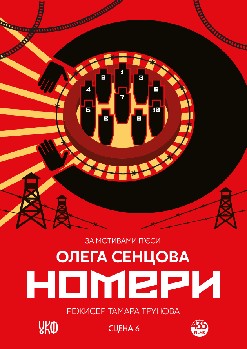
Польський кіноінститут підтримає виробництво фільму «Номери» Олега Сенцова.
Стрічку створюють у копродукці України та Польщі за фінансової підтримки Міністерства культури України.
Співрежисером фільму стане Ахтем Сеітаблаєв.
Польський кіноінститут виділить на виробництво стрічки 1 млн. польських злотих (230 тис. євро).
7 грудня 2018 року відбудеться прем’єра вистави Тамари Трунової «Номери» за п’єсою Олега Сенцова.
Продюсером фільму і вистави є Анна Паленчук.
Сергій Васильєв
The Polish Film Institute announces its final production grants of 2018
Olga Chajdas, Jan P Matuszyński, Jasmila Zbanic and Oleg Sentsov are among the filmmakers being supported by the main Polish funding body.
In its third and final session of 2018, the Polish Film Institute (PFI) has decided to support eight Polish features and six international projects that feature Poland as a minority partner.
The international projects being supported by the PFI include Numbers, directed by Oleg Sentsov and Akhtem Seitablaev (support of PLN 1 million, or €230,000), Leon Prudovsky’s My Neighbour Adolph (PLN 900,000, or €209,000), Jasmila Zbanic’s Quo Vadis Aida (PLN 840,000, or €195,350), Jakub Wroński and Ira Cerpelan’s animated film The Memoirs of Moominpappa (PLN 621,345, or €144,500), Christos Nikou’s Apples (PLN 326,00, or €75,814), and Tommer Heymann and Barak Heymann’s documentary The Last Work (PLN 256,000, or €60,000).
The biggest domestic subsidy of PLN 1.8 million (€420,000) is to be given to two filmmakers: Olga Chajdas, whose intimate LGBT drama Nina was awarded at Rotterdam, got a grant for her upcoming project, entitled Constantly Inconstant, and debuting director Aleksandra Janowska received backing for Anatomy. Four projects secured PLN 1 million (€0.23 million) in support each. Two are set to be directed by experienced helmers: Robert Gliński, who is making Gorki’s Sanatorium, and Leszek Wosiński, who is about to direct Pilecki’s Report. Both films are period dramas related to the events of World War II. The former will revolve around the mass murder of Polish army officers and intelligentsia by the Soviet Union in 1939-1940, a crime that was first tackled in fiction form by Andrzej Wajda and his Katyn. Meanwhile, the title character of Wosiński’s film, Witold Pilecki, was a Polish officer and intelligence agent who voluntarily became a prisoner in the Auschwitz concentration camp in order to compile a report on the Nazi atrocities. Three years after the war, he was sentenced to death by Poland’s communist regime for alleged espionage and a host of other charges.
The sum of PLN 1 million (€230,000) will also be given to two second-time directors: Kordian Piwowarski, for his project Strawberry Soup, and Jan P Matuszyński (The Last Family), who is working on Leave No Traces, a narrative film based on the non-fiction book of the same name by Cezary Łazarewicz. The story is about a high-school student who was arrested and killed by communist Poland’s Security Service in 1983, and the project scooped the MIDPOINT Award at the Cottbus Film Festival in 2017. Michał Kwieciński, who is both a director and a producer at Akson Studio – the company that worked on Afterimage, Andrzej Wajda’s last film – will get PLN 0.5 million (€110,000) to aid the production of Filip. The last project that was supported in this session is Joanna Zastróżna’s Forrest, which will receive PLN 0.8 million (€186,000).
The deadline for submissions for the first session of 2019 is yet to be announced.
Ola Salwa, Cineuropa, 4 грудня 2018 року
